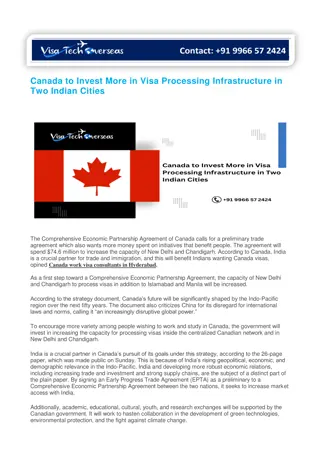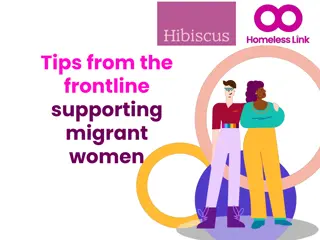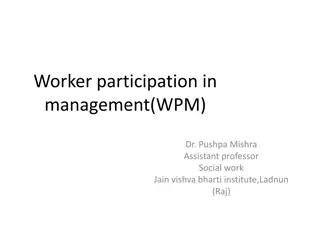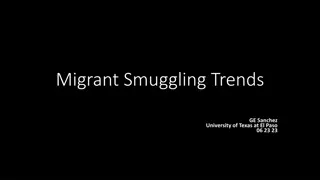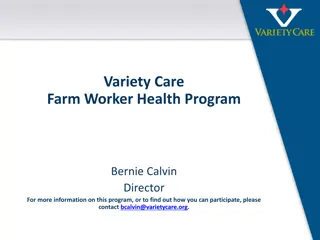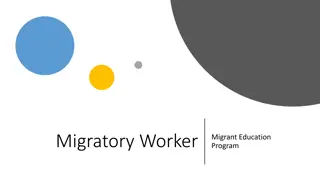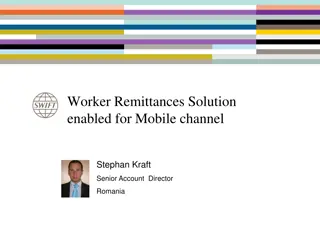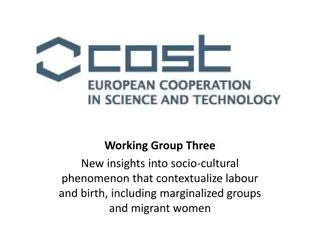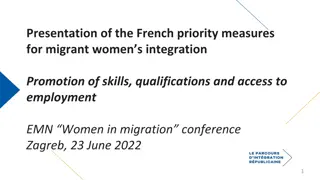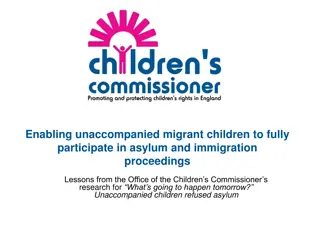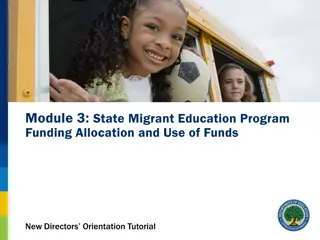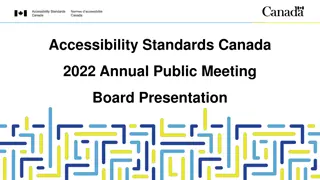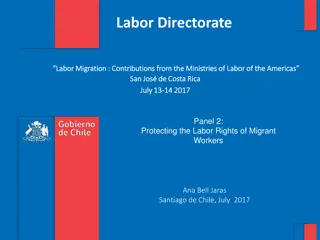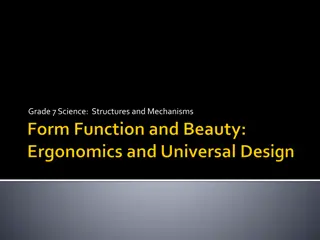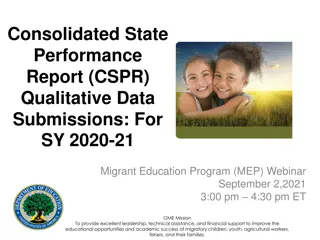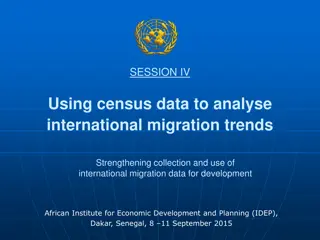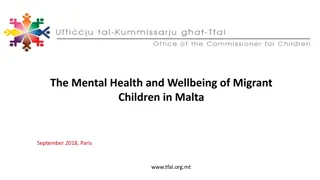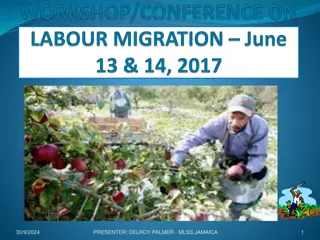Understanding Migrant Worker Experiences in Canada
This study explores the experiences of migrant workers transitioning to permanent residence in Canada, highlighting the increasing trend of such transitions and the challenges faced. The research delves into factors influencing their decision to seek permanent residence, the issues encountered during the transition process, and the support systems utilized. Insights from field research conducted in three provinces offer valuable perspectives on the implications for settlement and the need for further study in this area.
Uploaded on Sep 18, 2024 | 0 Views
Download Presentation

Please find below an Image/Link to download the presentation.
The content on the website is provided AS IS for your information and personal use only. It may not be sold, licensed, or shared on other websites without obtaining consent from the author. Download presentation by click this link. If you encounter any issues during the download, it is possible that the publisher has removed the file from their server.
E N D
Presentation Transcript
Migrant worker experience with permanent residence (PR) in Canada Some observations and recommendations Prof. Delphine Nakache, University of Ottawa Kingston, April 2018
Why study migrant worker-PR transitions? An increasing number of migrant workers transition to permanent residence (PR) once in Canada 718 % increase since 2002 (68 280 in 2017) Approx. 1 out of 4 becomes PR from within Canada Temporary work-immigration = prevailing pathway Not only workers in high-skilled occupations 2013-2014: approx. 20 % performing jobs in low-skilled (NOC C & D) occupations Although higher-skilled temporary foreign workers had more pathways to become permanent residents, the transition rate was not much higher than that of lower-skilled workers when differences in program types and sociodemographic characteristics were taken into account. Furthermore, temporary foreign workers from less economically developed countries tended to have higher transition rates than their counterparts from developed countries (Lu and Feng Hou (2017): Transition from Temporary Foreign Workers to Permanent Residents, 1990 to 2014 )
How is the transition happening? traditionally only Federal immigration programs skilled occupations Provincial Nominee Programs (PNPs) more varied Between 2009 and 2013, 53 % of workers nominated by Manitoba in low-skilled occupations (30,5 % for Alberta and 0% for Ontario) PNPs = federal-provincial agreements (1) Potential immigrants submit an application to the province or territory where they want to be nominated; (2) Once nominated, IRCC conducts security, criminal and health checks The second largest source of economic immigration to Canada
Filling the Gap Migrant worker experience with immigration opportunities within Canada largely understudied 1. What factors lead migrant workers to seek PR? 2. What issues/challenges do migrant workers face in their transition to PR and and what support do they use to overcome these challenges? 3. What are the implications for settlement?
Methodology Primary field research conducted in 2014-2015 99 participants from 3 provinces (Ontario, Alberta, Manitoba) 48 current migrant workers, 22 former migrant workers 4 civil servants (municipal/provincial) 2 labour union representatives 11 non-governmental (service provider organizations) representatives 12 employers
Regional responses to permanent residency for migrant workers at time of field research Manitoba All skill levels can apply Alberta Opportunities for workers in low-skilled occupations exist, but more limited than for skilled Ontario Opportunities for skilled only
In progress: Work-Life Family Balance (with L. Codillo) Occupational Health and Safety at work and during the transition process (with L. Codillo and K. Lippel)
THE CRUCIAL IMPORTANCE OF FAMILY
Negative impacts of prolonged family separation Especially affecting workers in low-skilled occupations No regulatory bar to having family members accompany a worker BUT in reality, very difficult- usually impossible- for a worker in low- skilled job to do so Misleading information during the recruitment phase Despite the importance of work-family balance (WFB) acknowledged in the literature, WFB inexistent among these workers And yet, the most important reason for their efforts to attain PR (and endure abusive situations)
Its hard. Because for like how many years you are living with your wife and with your kids and you left your kids abroad When I left, my kid was 1 year and 3 months. And now he s turning 8 years old this coming September. And then I went home 2 times and every time I go home he always ask me, mommy when I can go with you? I want to see the Canada. I just say, soon, soon, soon, I just keep praying. It s hard (,..) Especially Christmas time is coming, birthdays, oh my god, this is the hard thing. Because the occasions that we are not with them, especially when they are sick, we cannot do anything about it, right? We just keep sending money for them (Tina, current worker, low-skilled Alberta) (Jorge, former worker (now PR), Alberta) I have two daughters. When I come to Saudi Arabia, my eldest is 1 month. And when I go back to the Philippines, my contract is 4 years, so I go back and I saw my daughter, she is already 4 years old. She doesn't know me ( ) It s hard. It s very hard. When I go back home, I have two months vacation there and my wife gets pregnant again and then I need to go back to Saudi Arabia. And when I left the Philippines I didn t see my youngest until now. Since birth ( ) It s very challenging (Gustavo, current worker, low- skilled, Alberta )
I came here to strive to fight for my family and when I got married I thought it was forever. But I think the distance separated us ( ) A lot of the friends that I know here had the same problem, maybe 50% of the ones I know, were separated from their wives ( ) I would tell [someone in my position] to do everything possible not to leave his wife, not to be separated. Because in the end because of the kids of you have together, that is what you feel most. I d like to be with my daughters. A person would never like to be separated ( ) I used to think that if they allow people to come work here why don t they let their spouses come. That would have been great, imagine if it had been like that I would ve still been with my wife and then it would just be a matter of going and getting our kids and life would have been easier here. That s what I think (Carl, current worker, low-skilled, Manitoba)
Time factor/ importance of communication
Ensuring family unity in the state of employment In international law, no obligation of the state of employment to authorize/facilitate family accompaniment But a shared interest for both migrants and the state of employment Ex: Canada Migrant workers in low-skilled jobs contribute as much as workers in skilled jobs to Canada s workforce and social composition In Canada, BOTH skilled and low-skilled workers transition to PR Preserving family unity benefits Canada Happier, healthier, more productive workers etc.
I dont know how you can manage this. Because it s really hard, and of course if you have your family, you have motivation, you are an happy employee, you work harder, that s it. But without family, there s no motivation That s what family needs to be, to be together, kids. And that is going to transform the work and the environment better for you. That s the way, no doubt about it, you have to bring your family (Wen, current worker, low- skilled, Manitoba) (Mario, current worker, low- skilled, Manitoba) I would like them to have the ability to bring the spouses because if they have to leave their family that s very hard for someone to do and I wish that there was a better means to bring their spouses over early and help them because I think that would also help settle them (Manitoba Employer)
IRPA, s. 3(1)(d): to see that families are reunited in Canada Should not only apply to permanent residents and citizens A key priority of the current government Atlantic Immigration Pilot Project (March 2017) spouses or common-law partners of the pilot program participants receive an open work permit valid for one year An encouraging initiative!
REDUCING THE RISKS AND CHALLENGES ASSOCIATED WITH THE TRANSITION TO PERMANENT RESIDENCE The employer-driven process
Two main types of challenges/difficulties during transition 1) In accessing PR (PR requirements) The employer-driven stream* Language proficiency requirements 2) In applying for PR Confusion and complication in applying for permanent residence status An incertain environnent for migrant workers Immigration officers intransigent decisions
Issues surrounding the employer-driven process PR relies on luck- having a good or a bad employer Ex: Maple Leaf in Brandon (MB)- working hard , but having something in return ; no surprise Ex: not a supportive employer So they kind of made me nervous right, I am thinking like maybe they are not telling me because they are expecting to lay me off or something (...) their attitude made me very nervous (...) I felt like maybe if I could have kept it a secret from [them] I would have (...) been safe in Canada (Marcus, high-skilled, Alberta)
Ex: Bad Employer Experience Woo-hoo! A release. Because of that feeling, I m attached to this company (...) And you feel like a slave at some point. I mean this work, you are not a slave really, but (t)hey can do extra things, like abusive things, and you hate that (...) (Luis, former migrant worker, Alberta) Actually, this employer moved to the States. And he sold that franchise company to another guy. So the new boss, he was bad, he was really bad. But I say, you know what, if you want to have PR and want to be Canadian, you better hold on. Everybody left but me! But after 5 years, I got my PR So I m not stupid. I knew they were not gonna deport me, because I was here legally and I had a two-year work permit...but she knew I would accept She said, We re gonna do it like this...so we have no problem with Immigration or anything like that. What we re gonna do, you work [as if] you get paid $30 an hour and you re gonna get $300 [on the payroll] but you re gonna get paid $240 in reality ( ) So they have everything playing in their favour, basically. The rules of the government basically favours the employer 100 percent and the employee is, basically, at the employer s mercy whatever they wanna do, if it s a bad employer, and get screwed. If they don t give me the papers, they re basically, it s a paper they supply to say you are experienced, that you are a good worker, the company has to give you that. If they don t decide to give me that, what am I supposed to do? ( ) It s very hard...So is it worth it for me to take that risk? Because I have a family (Marco, high-skilled, Alberta)
PNP Requirements: Valid Work Permit Added complexity in AB and ON nominee programs Provincial officer must verify if worker is actually doing job indicated on the work permit Punitive on PNP applicant when employer breaks the law Denied PNP application at no fault of migrant worker applicant, rather due to employer negligence, e.g. violation of employment standards
It is essential that: The design of employer-driven immigration processes be re-examined: Employers are NOT best positioned to nominate migrant workers It is unfair for prospective PR to rely heavily on their relationship with their employers Alternatives be offered: Self-nomination with proof of work experience
PROVIDING IMMIGRATION INFORMATION TO MIGRANT WORKERS
Until recently, federally-funded services not available to migrant workers Some provinces stepped in and filled this gap Budget 2018 Pilot network of support organizations for migrant workers dealing with potential abuse by their employers Great initiative but more needs to be done for those who transition to PR SPOs = a safe space PR-related questions top reason for migrant worker visits to service provider organizations Reliable and trustworthy source of information (in comparison to immigration consultants and recruiters and sometimes lawyers) Service Gaps for those who transition to PR Lack of free legal services Language training
Free in-person immigration information is needed for migrant workers Essential to guarantee a smooth and safe transition In-person information sessions regarding PR opportunities by IRCC and provincial governments More federal government funding to NGOs that offer legal assistance to migrant workers, to expand their legal services to workers who transition to PR
Conclusion Policies need to be in place to facilitate transitions to PR, rather than complicate them No easy fix but some key steps are necessary Thank you! Questions? Comments? dnakache@uottawa.ca








